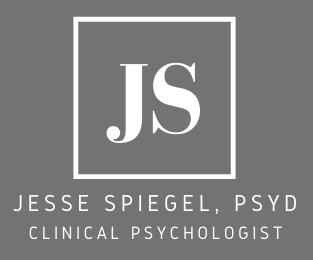WHAT IS OBSESSIVE-COMPULSIVE DISORDER (OCD)?
Obsessive Compulsive Disorder (OCD) is a neurobiological disorder that causes intense distress and anxiety among individuals. It appears in both children and adults. OCD is characterized by both obsessions and compulsions, both of which are quite overwhelming for individuals and can often negatively impact their day-to-day functioning.
Obsessions are recurrent and persistent thoughts, urges, or impulses that are unwanted and intrusive. People with OCD engage in compulsions, which are repetitive behaviors and/or mental acts, to reduce the distress from obsessions. These compulsive behaviors often need to be repeated whenever a triggering situation or anxious thought comes up, which can lead to a long-term deficit and never-ending cycle.
EFFECTIVE TREATMENT OF OCD
Dr. Spiegel uses Exposure and Response Prevention (ERP) in treating OCD. ERP is supported by research and is considered the Gold Standard for OCD treatment. ERP consists of exposures in which sufferers purposefully confront the various situations, objects, images, and/or thoughts that are anxiety triggering. At the same time, individuals seek to eliminate the various compulsions that they are doing.
Treatment is individually tailored at a pace that ensures the most likelihood of success. Individuals learn to gradually and systemically face their fears while not engaging in compulsions. This provides a sense of accomplishment in being able to confront challenging thoughts and feelings. ERP provides hope for individuals in moving forward and no longer being paralyzed by their fears.
TREATMENT OF CHILDREN WITH OCD
Among children with OCD, the diagnosis negatively impacts the entire family unit. Children feel stuck and parents can get confused about where their child ends and where OCD begins. This leads to exhaustion and frustration for both parents and children.
When working with children, Dr. Spiegel helps to create a team among the family to unite and deal with OCD together. He helps children and parents externalize and boss back the OCD together. He helps children to become more empowered and confident in learning new ways to respond to their OCD. Dr. Spiegel also teaches parents how to respond in a way that decreases their child’s sense of shame, and instead recognizes their child’s strengths and ways of facing their fears. This helps provide a sense of hope for everyone involved.
Through the use of the “Worry Monster” concept, the child and family learn how to boss back the OCD. He helps children learn new ways to recognize when the OCD Monster is tugging on them and how to react in an empowered way. Dr. Spiegel will also engage the entire family unit to learn how to externalize OCD, and look at the child as an individual separate from their OCD. He helps parents learn to respond in a way that decreases their child’s sense of shame.
RESOURCES & MORE INFORMATION ON OCD & RELATED DISORDERS
To learn more about OCD, as well as effective treatments for this diagnosis, visit:
Recommended Books:
Freedom from Obsessive Compulsive Disorder: A Personalized Recovery Program for Living with Uncertainty by Jonathan Grayson
Talking Back to OCD: The Program That Helps Kids and Teens Say “No Way” - and Parents Say “Way to Go” by John S. March
The Mindfulness Workbook for OCD: A Guide to Overcoming Obsessions and Compulsions Using Mindfulness and Cognitive Behavioral Therapy by Jon Hershfield

